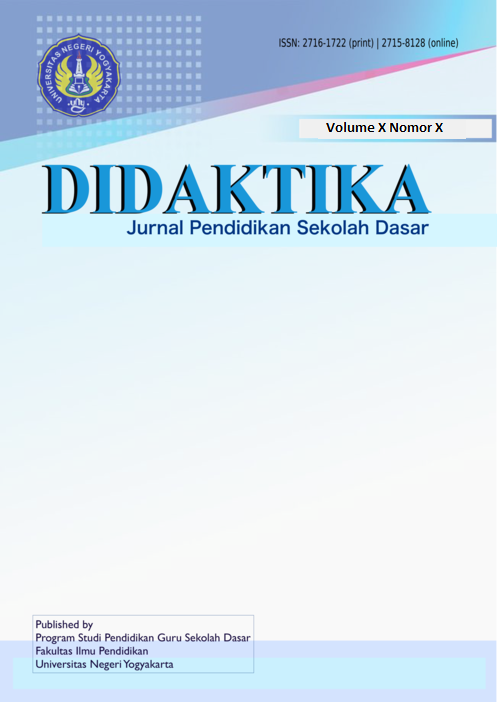Korelasi antara Interaksi Sosial Terhadap Hasil Belajar Afektif Siswa Sekolah Dasar
DOI:
https://doi.org/10.21831/didaktika.v3i1.28120Abstract
Social interaction is the relationship between one individual and another individual, one individual can influence other individuals so that there is reciprocity. The better the students' social interactions, the better their learning outcomes will be. Learning outcomes examined in this study are affective learning outcomes. This study aims to reveal whether the better social interaction, the better the affective learning outcomes of fifth-grade students in SDN throughout Kaliwates Jember District. The population of this research is the fifth-grade students of SDN in Kaliwates Jember District. This study is a correlation study with a population of 182 and a sample of 25 students. The main methods of collecting data are questionnaire and observation. To test the research hypothesis using the product-moment correlation formula with the help of SPSS 20 at a significance level of 5%. The results of the research analysis obtained the value of r_count> r_tabel (0.748 > 0.266) and the coefficient of determination 56%. This shows that social interaction has a contribution of 56% to affective learning outcomes the remaining 44% is influenced by other factors. It can be concluded that the better social interaction, the better the affective learning outcomes of fifth-grade students of SDN in Kaliwates Jember District.
Keywords: Social interaction, affective learning outcomes, elementary school student
References
Aunurrahman. (2014). Belajar dan pembelajaran. Bandung: Alfabeta.
Clark, L. A., & Watson, D. (1995). Constructing validity: Basic issues in objective scale development. Psychological Assessment, 7(3), 309-319.
Dayaksini, T. & Hudaniah. (2009). Psikologi Sosial. Malang: UMM Press.
Delcourt, M. A. B., Cornell, D. G., & Goldberg, M. D. (2007). Cognitive and Affective Learning Outcomes of Gifted Elementary School Students. Gifted Child Quarterly, 51(4), 359–381. https://doi.org/10.1177/0016986207306320
Durlak, J. A., Weissberg, R. P., Dymnicki, A. B., Taylor, R. D., Schellinger, K. B. (2011). The Impact of Enhancing Students' Social and Emotional Learning: A Meta-Analysis of School-Based Universal Interventions. Child Development, 82(1), 405-432. https://doi.org/10.1111/j.1467-8624.2010.01564.x.
Effendi, R. & Malihah, E. (2011). Panduan Kuliah Pendidikan Lingkungan Sosial, Budaya, Teknologi. CV. Maulana Media Grafika: Bandung.
Fernanda, M., Sano, A., & Nurfarhanah. (2012). Hubungan antara Kemampuan Berinteraksi Sosial dengan Hasil Belajar. Konselor, 1(2). doi: https://doi.org/10.24036/0201212698-0-00
Huda, S. (2017). Effect of Internal Factors and External Factors on Learning Achievement Intermediate Financial Accounting Course I. Integrated Journal of Business and Economics, 1(2), 33-42.
Jones, J. (2012). The External And Internal Educational Factors That Contribute To Student Achievement And Self-Perceptions Of Urban Middle School Title I Students. Dissertation. New Jersey: Rowan University. Retrieved from https://rdw.rowan.edu/cgi/viewcontent.cgi?article=1239&context=etd
Masyhud, M. S. (2016). Metode Penelitian Pendidikan. Jember: Lembaga Pengembangan Manajemen dan Profesi Kependidikan.
Purnomo, Y. W. (2017). A scale for measuring teachers' mathematics-related beliefs: A validity and reliability study. International Journal of Instruction, 10(2), 23–38. https://doi.org/10.12973/iji.2017.1022a
Nunnally, J. C., & Bernstein, I. H. (1994). Psychometric theory (3rd ed.). New York, NY: McGraw-Hill.
Purwanto. (2014). Evaluasi Hasil Belajar. Yogyakarta: Pustaka Pelajar.
Slameto. (2003). Belajar dan Faktor Faktor yang Mempengaruhinya. Jakarta: PT Rineka Cipta.
Sugiyono. (2015). Metode Pendidikan. Bandung: Alfabeta.
Downloads
Published
How to Cite
Issue
Section
Citation Check
License
- Authors retain copyright and grant the journal right of first publication with the work simultaneously licensed under a Creative Commons Attribution License that allows others to share the work with an acknowledgement of the work's authorship and initial publication in this journal.
- Authors are able to enter into separate, additional contractual arrangements for the non-exclusive distribution of the journal's published version of the work (e.g., post it to an institutional repository or publish it in a book), with an acknowledgement of its initial publication in this journal.
- Authors are permitted and encouraged to post their work online (e.g., in institutional repositories or on their website) prior to and during the submission process, as it can lead to productive exchanges, as well as earlier and greater citation of published work.






